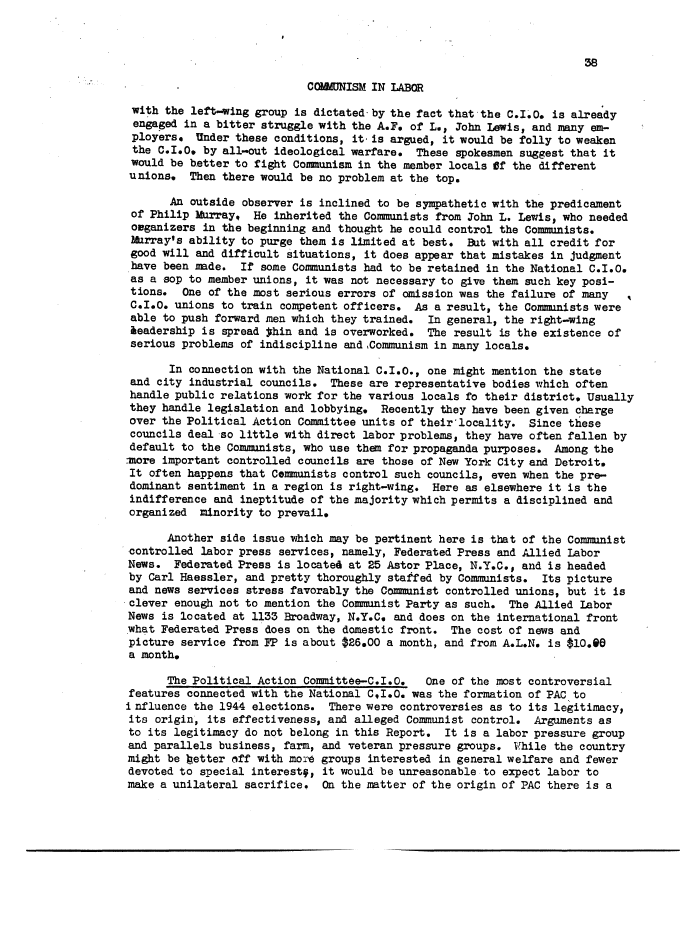 |
||||
 |
||||
| 38 COMMUNISM IN LABOR with the left-wing group is dictated by the fact that the C.I.O. is already engaged in a bitter struggle with the A.F. of L., John Lewis, and many em- ployers. Under these conditions, it is argued, it would be folly to weaken the C.I.O. by all-out ideological warfare. These spokesmen suggest that it would be better to fight Communism in the member locals 6f the different unions* Then there would be no problem at the top. An outside observer is inclined to be sympathetic with the predicament of Philip Murray, He inherited the Communists from John L. Lev/is, who needed organizers in the beginning and thought he could control the Communists. Murray's ability to purge them is limited at best. But with all credit for good will and difficult situations, it does appear that mistakes in judgment have been made. If some Communists had to be retained in the National C.I.O. as a sop to member unions, it was not necessary to give them such key posi- tions. One of the most serious errors of omission was the failure of many , C.I.O. unions to train competent officers. As a result, the Communists were able to push forward men which they trained. In general, the right-wing leadership is spread jrhin and is overworked. The result is the existence of serious problems of indiscipline and ^Communism in many locals. In connection with the National C.I.O., one might mention the state and city industrial councils. These are representative bodies which often handle public relations work for the various locals fo their district. Usually they handle legislation and lobbying. Recently they have been given charge over the Political Action Committee units of their'locality. Since these councils deal so little with direct labor problems, they have often fallen by default to the Communists, who use them for propaganda purposes. Among the more important controlled councils are those of New York City and Detroit. It often happens that Communists control such councils, even when the pre- dominant sentiment in a region is right-wing. Here as elsewhere it is the indifference and ineptitude of the majority which permits a disciplined and organized minority to prevail. Another side issue which may be pertinent here is that of the Communist controlled labor press services, namely, Federated Press and Allied Labor News. Federated Press is located at 25 Astor Place, N.Y.C., and is headed by Carl Haessler, and pretty thoroughly staffed by Communists. Its picture and news services stress favorably the Communist controlled unions, but it is clever enough not to mention the Communist Party as such. The Allied Labor News is located at 1133 Broadway, N.Y.C. and does on the international front what Federated Press does on the domestic front. The cost of news and picture service from IP is about $26.00 a month, and from A.L.N. is $10.00 a month* The Political Action Committee-C.I.O. One of the most controversial features connected with the National C,I.O. was the formation of PAC to i nfluence the 1944 elections. There were controversies as to its legitimacy, its origin, its effectiveness, and alleged Communist control. Arguments as to its legitimacy do not belong in this Report. It is a labor pressure group and parallels business, farm, and veteran pressure groups. While the country might be fetter off with more groups interested in general welfare and fewer devoted to special interests, it would be unreasonable to expect labor to make a unilateral sacrifice. On the matter of the origin of PAC there is a |